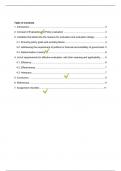Table of Contents
1. Introduction ................................................................................................................. 3
2. Concept of Evaluation and Policy evaluation .............................................................. 3
3. Variables that determine the reasons for evaluation and evaluation design ................ 4
3.1. Ensuring policy goals and avoiding failure ............................................................ 4
3.2. Addressing the requirement of political or financial accountability of government 5
3.3. Determination of policy.......................................................................................... 6
4. List of requirements for effective evaluation, with their meaning and applicability ....... 6
4,1. Efficiency............................................................................................................... 6
4.2. Effectiveness......................................................................................................... 7
4.3. Adequacy .............................................................................................................. 7
5. Conclusion .................................................................................................................. 8
6. References .................................................................................................................. 9
7. Assignment checklist ................................................................................................. 11
, 1. Introduction
Policy evaluation helps to promote public accountability, learning, and higher public sector
effectiveness by facilitating better decision making. The essay will demonstrate an
understanding of the concepts of policy evaluation and evaluation, as well as identify
variables that determine the reasons for evaluation and design. The requirements for
effective policy evaluation will be reviewed, and their significance and relevance will be
critically assessed. Relevant examples will be presented to support my claims.
2. Concept of Evaluation and Policy evaluation
Mtshali (2000:68) defines evaluation as a periodic examination of the relevant
performance, efficiency, and impact of a project in relation to its stated objectives. It
entails comparisons that require information from outside the project in terms of time,
geography, or population. To put it simply, evaluation is the systematic and objective
examination of an ongoing or concluded project, program, or policy, including its design,
implementation, and outcomes. Evaluation considers unexpected outcomes of a project.
The potential of evaluation can be realized if it is clear who will utilize the results and for
what purpose, and the practical limits of available methodologies are acknowledged in
the project setting (Mtshali 2000:68).
Evaluation, according to Mtshali (2000:68), is the process of regularly assessing a
project's impact, effectiveness, and performance in accordance with its predetermined
goals. It involves comparisons requiring data on time, geography, or population that
comes from sources other than the project. A project, program, or policy's conception,
implementation, and results are all subject to a methodical and objective review during its
ongoing or completed phase, which is evaluation. Evaluation takes into account
unforeseen project consequences. If it is clear who will use the results and for what
purpose, and if the project setting acknowledges the practical limitations of the available
approaches, evaluation's potential can be achieved (Mtshali 2000:68). Evaluation serves
two competing purposes, lesson learning and accountability (Cracknell 2000:54). The
evaluation process includes extracurricular activities, processes, extra data collection,
and suggestions for future changes.




